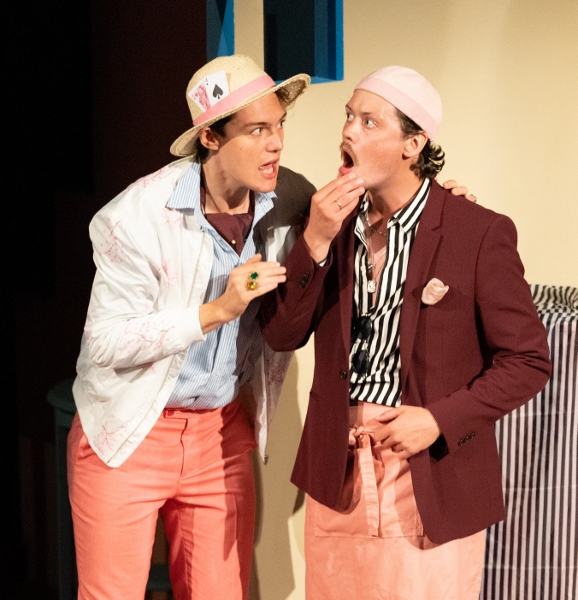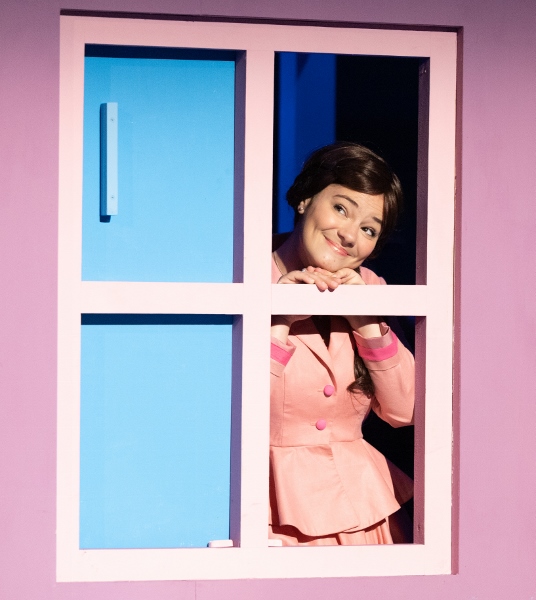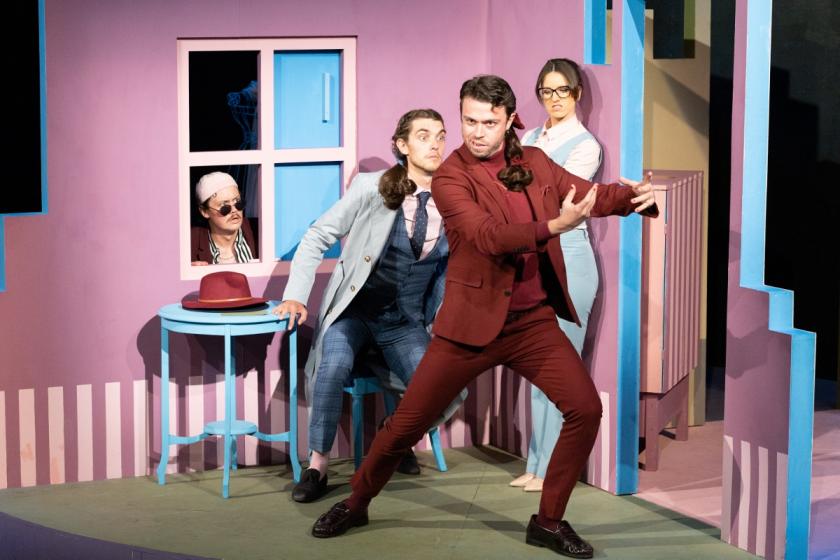Harnessing the enthusiasm of youth has always been what Clonter Opera, on a farm in Cheshire, is about with its summer productions. The house is relatively small (there’s always a reduced orchestration as accompaniment), and the idea is that promising young voices can get a chance to try their luck with an audience and learn in the process.
It's been notably successful in the past, as star after star has taken the first steps towards a durable career under the care of Clonter’s music staff and directors. This production was no exception: in fact the maturity of the lower male voices on display in this Rossini Barbiere was impressive. One of them, Henry Neill’s (as Figaro, pictured with Samuel Kibble as Almaviva), is pretty well experienced already – he was also Figaro in the 2017 Clonter production of Mozart’s Beaumarchais opera, garnering plaudits at the time, and has begun a distinguished international career.
 If labouring under Covid conditions might have seemed a challenge this year (the production was first planned for 2020 but inevitably postponed), Clonter proved its resourcefulness by adapting to new limitations. The band comprised 11 players, spilling out of the little pit into the side of the auditorium, but that actually broadened its sound, as the cello and double bass were well audible.
If labouring under Covid conditions might have seemed a challenge this year (the production was first planned for 2020 but inevitably postponed), Clonter proved its resourcefulness by adapting to new limitations. The band comprised 11 players, spilling out of the little pit into the side of the auditorium, but that actually broadened its sound, as the cello and double bass were well audible.
Philip Sunderland conducted and provided continuo, so we can call that 12 executant musicians. His steady hand was a rock for the seven-strong cast, who between them managed to present the entire story, and his sense of tempo and pulse served up the menu perfectly à la Rossini.
There’s never been a big budget for sets at Clonter, so ingenuity is their watchword. This year designer Bettina John and set builder Oliver Rock provided something I don’t remember ever seeing before: a revolve! It has to be hand-operated, like a playground roundabout, by the cast themselves, but they proved they could do that and sing at the same time, even in the complicated ensembles. On the little circular moving platform there were four alternative mini-interiors with doors from some to others, and with a suspended “window” in an auditorium box to represent Rosina’s upstairs chamber, it did everything required.
Costumes were colourful and a little whimsical, to match the set – perhaps seeking a present-day equivalence to commedia dell’ arte, I wondered? – but anyway they were cheerful. It was a fun show, as it should be, and the production clearly benefitted very much from direction by Greg Eldridge (who took it over for this year). His gift, I would say, is mightily to do with working with performers to bring a story to life and engage an audience. This definitely did that, even working in a couple of pandemic-related jokes extra to the original, and letting George Reynolds as Fiorello (he was also the police officer and notary) set the pace by gesturing to the audience to calm its applause down where the text calls for some silencio.
 Elsa Roux Chamoux (pictured left) played Rosina as a feisty Latin young lady, owning the stage in her Una voce poco fa and spitting the notes out with glee, and tenderly sweet in the Ah, qual colpo trio: Faryl Smith played dumb-show like a pro as Berta and revealed a lovely voice in her big aria near the end. And, as a kind of double act, Adam Maxey’s Bartolo and Benjamin Schilperoort’s Basilio, enjoyed their comedy chances, too, carrying conviction despite their youthful years, with powerful singing from both.
Elsa Roux Chamoux (pictured left) played Rosina as a feisty Latin young lady, owning the stage in her Una voce poco fa and spitting the notes out with glee, and tenderly sweet in the Ah, qual colpo trio: Faryl Smith played dumb-show like a pro as Berta and revealed a lovely voice in her big aria near the end. And, as a kind of double act, Adam Maxey’s Bartolo and Benjamin Schilperoort’s Basilio, enjoyed their comedy chances, too, carrying conviction despite their youthful years, with powerful singing from both.
Henry Neill’s was a youthful Figaro, very much a comrade to the young Almaviva of Samuel Kibble, whose lyric tenor is highly listenable to, with signs of greater things to come. The two of them made another double act, too, in the All’idea duet, blending in tone and well balanced.
Some of the best moments came in the two finales, the Act One sextet beautifully integrated, well tuned and finely disciplined, and with the “stupefaction” section effectively staged.














Add comment